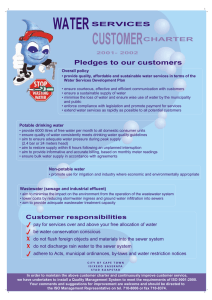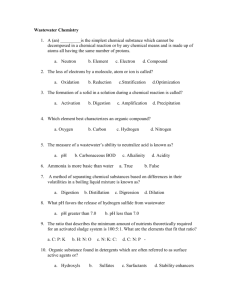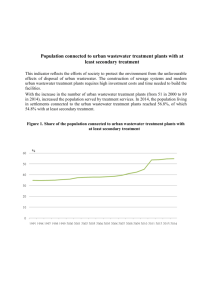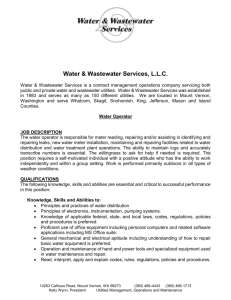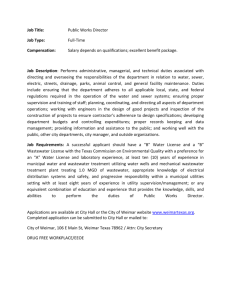WASTEWATER TREATMENT
advertisement
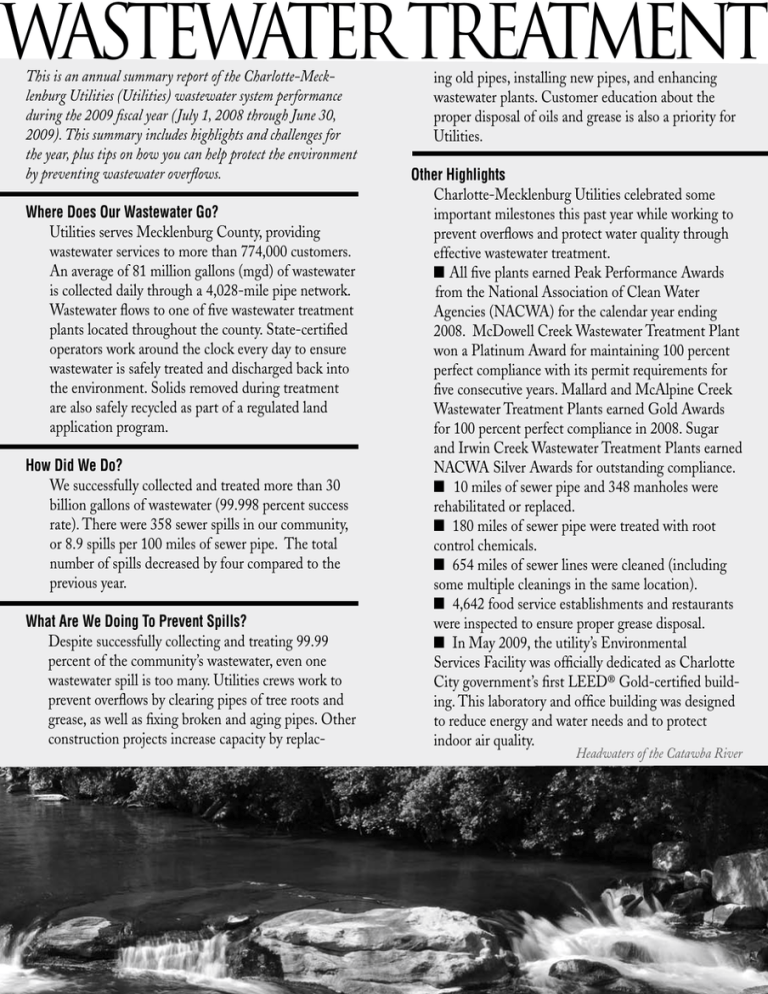
WASTEWATER TREATMENT This is an annual summary report of the Charlotte-Mecklenburg Utilities (Utilities) wastewater system performance during the 2009 fiscal year (July 1, 2008 through June 30, 2009). This summary includes highlights and challenges for the year, plus tips on how you can help protect the environment by preventing wastewater overflows. Where Does Our Wastewater Go? Utilities serves Mecklenburg County, providing wastewater services to more than 774,000 customers. An average of 81 million gallons (mgd) of wastewater is collected daily through a 4,028-mile pipe network. Wastewater flows to one of five wastewater treatment plants located throughout the county. State-certified operators work around the clock every day to ensure wastewater is safely treated and discharged back into the environment. Solids removed during treatment are also safely recycled as part of a regulated land application program. How Did We Do? We successfully collected and treated more than 30 billion gallons of wastewater (99.998 percent success rate). There were 358 sewer spills in our community, or 8.9 spills per 100 miles of sewer pipe. The total number of spills decreased by four compared to the previous year. What Are We Doing To Prevent Spills? Despite successfully collecting and treating 99.99 percent of the community’s wastewater, even one wastewater spill is too many. Utilities crews work to prevent overflows by clearing pipes of tree roots and grease, as well as fixing broken and aging pipes. Other construction projects increase capacity by replac- ing old pipes, installing new pipes, and enhancing wastewater plants. Customer education about the proper disposal of oils and grease is also a priority for Utilities. Other Highlights Charlotte-Mecklenburg Utilities celebrated some important milestones this past year while working to prevent overflows and protect water quality through effective wastewater treatment. nAll five plants earned Peak Performance Awards from the National Association of Clean Water Agencies (NACWA) for the calendar year ending 2008. McDowell Creek Wastewater Treatment Plant won a Platinum Award for maintaining 100 percent perfect compliance with its permit requirements for five consecutive years. Mallard and McAlpine Creek Wastewater Treatment Plants earned Gold Awards for 100 percent perfect compliance in 2008. Sugar and Irwin Creek Wastewater Treatment Plants earned NACWA Silver Awards for outstanding compliance. n 10 miles of sewer pipe and 348 manholes were rehabilitated or replaced. n 180 miles of sewer pipe were treated with root control chemicals. n 654 miles of sewer lines were cleaned (including some multiple cleanings in the same location). n 4,642 food service establishments and restaurants were inspected to ensure proper grease disposal. n In May 2009, the utility’s Environmental Services Facility was officially dedicated as Charlotte City government’s first LEED® Gold-certified building. This laboratory and office building was designed to reduce energy and water needs and to protect indoor air quality. Headwaters of the Catawba River Challenges Of the 358 sewer spills that occurred, more than half were due to hardened grease clogging pipes and backing up the system. Other spill causes included the infiltration of tree roots into pipes, vandalism, general debris, and broken pipes. You Can Help Prevent Sewer Spills n After cooking, don’t pour grease down the drain! n Grease clogs pipes like it clogs arteries. n Dispose of animal fats and grease by freezing them in a coffee can - mix liquefied vegetable fats with kitty litter or coffee grounds – and deposit them in the trash or recycle at a full-service recycling center. CHARLOTTE-MECKLENBURG UTILITIES Protecting Our Environment Suspect A Sewage Spill? Call 311 (or 704-336-7600). We will respond 24 hours a day, 365 days a year. Want To Read The Full Report? The complete 2009 Wastewater Performance Report can be obtained at www.cmutilities.com or by mail by dialing 311. Waste Water Report ID #: - 30320-I-0082 30% recycled fiber Wastewater Performance Report 2009 Little Sugar Creek

